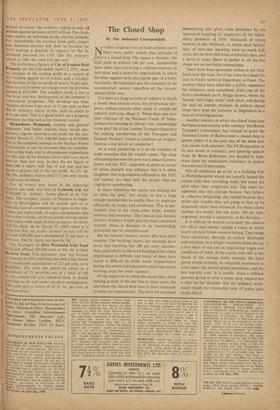The Closed Shop
By Our industrial Correspondent
No other single activity of trade unionists earns them more public odium than attempts to enforce a closed shop. The reason is obvious: the final push to achieve 100 per cent, membership more often than not brings a collision between an individual and a powerful organisation. in which the latter appears to be playing the part of a bully. Inevitably, the individual gets the sympathy of the uncommitted, almost regardless of the circum- stances of the case.
Yet there are large sections of industry in which a closed shop already exists, for all practical pur- poses, without anyone either inside or outside the industry worrying about it. When does one ever hear criticism of the National Union of Mine- workers for insisting on 100 per cent, membership in the pits'? Or of the London Transport Executive for making membership of the Transport and General Workers' Union a condition of employ- ment as a bus driver or conductor?
As in most pioneering. it is on the frontiers of trade unionism that the trouble comes. The close relationship between the post-war Labour Govern- ments and the TUC suggested so great an access of union , strength and influence that it is often forgotten that organisations affiliated to the TUC still control less than half the people who are eligible for membership.
In many industries the unions are seeking not to 'close the shop,' but simply to win a large enough membership to enable them to negotiate effectively on wages and conditions. This is par- ticularly true in the white-collar fields, notably banking and insurance. The Clerical and Admin- istrative Workers' Union also has been concerned recently about a decrease in its membership, principally due to unemployment.
But the manual workers' unions also have their troubles. The building unions, for example, have never had anything like 100 per cent, member- ship, particularly in the small building firms where organisation is difficult, and many of them have found it difficult to make much improvement during the severe unemployment which has struck building since the credit squeeze.
Of the industries in which the unions have been making ground in the last two or three years, the one where the closed shop issue is most important is motor-car manufacture. The drive for increased membership was given some assistance by the insensitive handling by employers of the redun- dancy problems of 1956: thousands of young workers in the Midlands, to whom their fathers' tales of inter-war hardship were so much folk myth, felt the first chill wind of adversity then, and a drive in many places to gather in all the lost sheep was an inevitable consequence.
There have been spasmodic strikes in the Mid- lands over the issue, but it has come to a head this year in Ford's works at Dagenham, in Essex. The workers there have inherited a public reputation for militancy, even cussedness, from one of the firm's constituent parts, Briggs factory, where the famous 'bell-ringer strike' took place; and during the past six months attempts to enforce closed shops have kept the factories in Dagenham in a state of recurring tension.
Another industry in which the closed shop issue has been raised recently is the railways. The British Transport Commission has refused to grant the National Union of .Railwaymen a closed shop in grades where it is the only one of the three rail- way unions with members. The NUR executive, in its new mood of militancy, and ignoring appeals from Sir Brian Robertson, has decided to with- draw from the consultative machinery in protest from the end of this month.
Not all employers go as far as a building firm in Wolverhampton which has actually helped the unions with their recruiting work; but many are glad when their employees join. The. more en- lightened take this attitude because they believe in collective bargaining; the cynical because they prefer any trouble they are going to face to be organised, rather than whimsical. For those whose workers are nearly, but not quite, 100 per cent. organised, trouble is constantly on the horizon.
It is difficult to analyse accurately the reasons for which men remain outside a union to which nearly all their fellow-workers belong. They range from conscience, through an acutely developed individualism, to a simple meanness about paying a fair share of the cost of negotiating wages and conditions of work. If the matter were left in the hands of the average trade unionist, the third group would probably be subjected to pressure in most cases; the second group sometimes; and the first scarcely ever. It is usually when a militant pressure group or even a single shop steward has a chip on the shoulder that the ordinary work- man's rough but reasonable code of justice goes by the board.






































 Previous page
Previous page